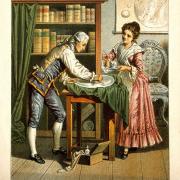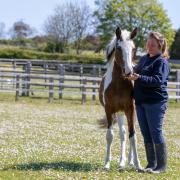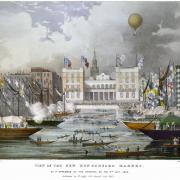Somerset has many famous connections – but a new book suggests the celebrated courtesan could be the first female celebrity with links to our county.
Lucy Locket lost her pocket,
Kitty Fisher found it.
Not a penny was there in it,
Only ribbon round it.

Kitty Fisher’s name has been remembered in a nursery rhyme. Infamous as an 18th-century ‘celebrated courtesan,’ she managed her public image with care. She was catapulted into widespread notoriety following an accident on The Mall in London. Kitty was riding with a friend, accompanied by two officers when her horse was spooked. It galloped away, reared up and deposited Kitty onto the ground. The only injury was to her pride. Perhaps it was Kitty’s quick wits, or maybe her natural good humour, but she saw the opportunity to turn her mishap into a positive.
Kitty laughed at herself and made light of drama. A crowd gathered, at first concerned and then charmed. Someone recognised Kitty and within days, she was a fixture in newspaper gossip columns. Prints showing her accident began to appear; the idea of a ‘fallen woman, falling’ was too tempting to the wits of the day. Kitty became an overnight sensation, the first woman to become a celebrity as we understand the concept today.
Two of Kitty’s lovers had connections with Somerset. One of the first men to become known as Kitty’s ‘keeper’ was Thomas Hutchings. He was in his early 30s, the rich, handsome and rakish heir to his uncle, Thomas Medlycott of Ven House in Milborne Port. (Tom later added his uncle’s surname to his own, becoming Thomas Hutchings Medlycott.)
Tom was described as ‘the smoothest, greyest villain of his years,’ but Kitty didn’t care. On his arm, she visited London’s pleasure gardens and theatres. Then, with abrupt coldness, he abandoned Kitty.
A few months later, Kitty found herself at the centre of an unusual arrangement. Five men who were members of a gambling club agreed to share Kitty’s favours. In return, they each pledged to give Kitty five per cent of their winnings. Poor Kitty was reduced to a commodity. One of the men was John Poulett, 2nd Earl Poulett of Hinton House, Hinton St George in south Somerset.

Poulett was the oldest of the disreputable gang, a gout-ridden but rich bachelor. He gambled within his limits and preferred to spend as little as possible. The cold, calculating scheme was his idea. He wanted Kitty but found her too expensive. Kitty’s thoughts have not survived, but the one benefit for her was that the deal proved lucrative. Each day, one or other of the men would have a win. Kitty’s share gave her a weekly income that was the equivalent of around £3,000–4,000 in today’s money.
The bargain was kept for a few months. Then, Kitty fell from her horse and found herself in the full glare of the celebrity spotlight. A scurrilous biography of her life was published. All the men who had been at Kitty’s side were alluded to, under pseudonyms but instantly recognisable to their contemporaries. Some were married, and others were trying to snare a rich heiress to bolster their fortunes. The writer mocked them. Just as Tom Hutchings did beforehand, four of the five men abandoned Kitty.
Earl Poulett was in a different position. His fortune was secure and, with no one to answer to, his reputation could withstand gossip and scandal. However, Poulett was alarmed to find himself the last man standing. He invited Kitty to spend the Easter of 1759 at Hinton House. Rumours swirled that Kitty was about to become a countess. In the end, no marriage proposal was forthcoming. Poulett wanted Kitty to live quietly, and inexpensively, in Somerset as his mistress. While Kitty was prepared to give up everything for a man she loved, Earl Poulett was not that man.
For a woman who is remembered as one of the country’s most famous – and infamous – courtesans, it comes as a surprise to realise that Kitty’s ‘career’ was short-lived. She would find romance, but Kitty’s story has no happy ending.
Towards the end of 1766, Kitty married John Norris of Hempsted Park in Kent. It was a love match. Less than six months later, she was dying. Kitty was suffering from tuberculosis, then known as consumption. The disease progressed rapidly, as Kitty’s immune system had been fatally weakened by her use of a fashionable, but toxic, lead-based skin-whitening cosmetic.
Kitty and her husband set off for the Bristol Hotwells, in the hope of a cure. The journey, made in March 1767, was slow-going and the roads were icy and treacherous. They made a stop at Bath, at the Three Tuns Lodging House.
Even in the winter season, the city ran to a timetable decided by the Master of Ceremonies. Day-to-day life was regimented. Elizabeth Montagu, the famous bluestocking, wrote that ‘the only thing one can do today [in Bath], we did not do the day before is to die.’ Within hours of her arrival in Bath, Kitty had done the one thing that you could do differently. The celebrated Kitty Fisher was dead, aged just 25 years.

Kitty Fisher: The First Female Celebrity by Joanne Major (Pen & Sword, 2022) details Kitty’s life. The book also looks at the women who were Kitty’s contemporaries and provides a social history of the era.
READ MORE: The Georgian era celebrity courtesans



























